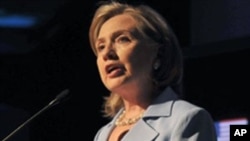Officials say Secretary of State Hillary Clinton will discuss lingering problem issues from the 2008 Russia-Georgia conflict, and the Nagorno-Karabakh dispute between Armenia and Azerbaijan in the trip to eastern Europe and the Caucasus region she begins Thursday. Clinton will visit Poland, Ukraine, Azerbaijan, Armenia and Georgia in the five-day trip.
The trip will be Clinton's first to the Caucasus region since taking office, and an opportunity to hear first-hand from leaders there on lingering territorial disputes that have hampered the political emergence of the former Soviet republics.
The brief 2008 war between Georgia and Russia left Russian troops occupying the breakaway Georgian regions of South Ossetia and Abkhazia despite international calls for a return to the pre-war status quo.
Briefing reporters on the trip, Assistant Secretary of State for European Affairs Philip Gordon said the Obama administration is dissatisfied with Russia's failure to date to live up to cease-fire requirements.
"We respect Georgia's sovereignty and territorial integrity, and we call on Russia to abide by its commitments in the August 2008 cease-fire, which not only called for the non-use of force and an end to hostilities, but called upon the parties to move their military forces back to where they were before the conflict began, and that hasn't been done," he said.
Gordon said in Armenia and Azerbaijan, Clinton will press the neighbors to live up to commitments under the Minsk Group process aimed at ending their long-running dispute over Nagorno-Karabakh, an Armenian controlled enclave within Azerbaijan. Tensions there have recently flared into violence.
"I think we've seen in some of the violence that has appeared in the region lately that we can't take stability for granted and Armenia and Azerbaijan would both benefit from moving forward in the Minsk Group process, and the Secretary will have a chance in both countries to underscore what the presidents said in Toronto the other day," he said.
President Barack Obama, Russian President Dmitri Medvedev and French President Nicolas Sarkozy - as the Minsk group co-chairs - issued a statement at the G20 summit in Canada last week urging Armenian and Azerbaijani leaders to complete work on basic principles for a peace accord.
Secretary Clinton begins the trip in Kyiv and a meeting with Ukrainian President Viktor Yanukovych. Assistant Secretary Gordon said while the Ukrainian leader, who took office in February, is considered more pro-Russian than his predecessor he has charted a independent course.
"When the new president was elected, he made clear that Ukraine didn't see its future as one choosing between East and West. Indeed he very symbolically made his first visit to Brussels and declared that his foreign policy was one of pursuing good relations with Russia - Ukraine has every right to want to have good relations with Russia - but also pursuing good relationships with Europe and the United States. And that's what we'd like to see happen," said Gordon.
Gordon said the Obama administration hopes to get beyond the notion that Central European countries have to choose whether they will be pro-Russian or pro-American. He said better relations between Washington and Moscow help advance that process.
Clinton to Tackle Nagorno-Karabakh, Georgia Issues During Trip




